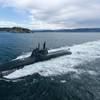In a partnership that will benefit both the government and commercial enterprise, the U.S. Navy’s Unmanned Undersea Vehicles (UUV) Program Office (PMS 403), small businesses and the NAVSEA Undersea Warfare Center are developing safer, more efficient energy sources for UUVs.
“Our efforts promise to pay dividends not only for the [military] user community, which will end up with safer products for use aboard fleet platforms, but for small business as well, which has an opportunity to expand a market and make a key contribution to our mission,” said Capt. Paul Ims, UUV program manager.
PMS 403 is responsible for developing UUV platforms and payload technologies to meet a broad spectrum of mission requirements. The Navy’s interest in UUVs parallels similar efforts by industry, which has developed UUVs for ocean exploration, mapping, salvage and petroleum surveying.
The Defense Department’s Small Business Innovation Research (SBIR) program is designed to adapt technologies to meet military requirements, benefiting both small business and the government. The program provides up to $850,000 in research and development funding directly to small firms for early-stage technology development projects, such as the ongoing UUV energy source effort. During 2004, the Navy awarded two SBIR Phase I contracts, worth $70,000 each, to firms to develop improved battery technology for UUVs.
The Navy project, called Advanced Pressure-Tolerant UUV Batteries for Fleet Use, is focused on the development of high energy density, renewable, air-independent submarine-safe power sources to increase UUV endurance and thereby increase the submarine range of influence, according to Navy project documents.
Demonstrating the kind of battery technology that may benefit Navy UUVs, Phoenix International’s remotely operated vehicles, called xBots, entered the shipwrecked RMS Titanic in July 2005. Each xBot carried two rechargeable lithium-ion batteries, each containing eight cells, providing 10 to 12 hours of energy, as developed during the first phase of the Navy SBIR project.
Energy sources developed for military use, such as new lithium-ion batteries, may offer significant cost savings and safety for commercial users. As the market broadens for new UUV battery technology, the unit price for the Navy and commercial users may decrease.
PMS 403 and its partners in government and industry are developing UUVs and related technologies to meet the goals detailed in the Navy’s UUV Master Plan. PMS 403 is one of seven program offices under the Navy’s Program Executive Office, Littoral and Mine Warfare and oversees a $1.254 billion portfolio of 211 programs. PEO LMW’s mission is to assure access throughout the littoral battle space, from the seabed through the surf-zone/beach-zone.
By Program Executive Office, Littoral and Mine Warfare
Source: Navsea
Sponsored Content
Chris-Marine’s solutions help to prolong engine lifetime

Subscribe for
Maritime Reporter E-News
Maritime Reporter E-News is the maritime industry's largest circulation and most authoritative ENews Service, delivered to your Email five times per week












